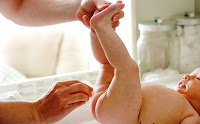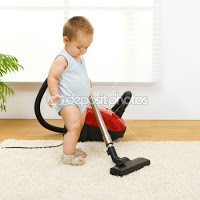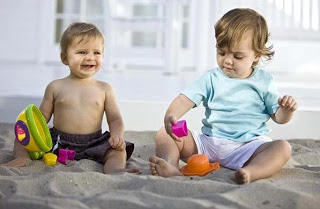From the moment an expectant parent sees those two blue lines they fantasise about the gender of their unborn child. However which are best to parent – daughters or sons? This collection of facts and stats should prove a good antidote to any gender disappointment.

The Joys of Having a Daughter:
The Baby Years:
- Mothers eat less in pregnancy when carrying a baby girl, which means less baby weight to lose (New Scientist).
- Mothers of baby girls are less likely to be angry or anxious during pregnancy (Evolutionary Psychology).
- If you’re stressed during pregnancy you’re less likely to miscarry a baby girl (The Economist).
- The labours of first-time mothers are almost 100 minutes shorter with a daughter than a son (Canadian Parents).
- You are less likely to suffer labour and delivery difficulties with a daughter (New Scientist; The Guardian).
- You’re less likely to need assisted delivery with a daughter – e.g. forceps (The Guardian).
- You’re less likely to have a c-section with a daughter (The Guardian).
- Baby girls are less likely to display signs of foetal distress during labour (The Guardian).
- You’re less likely to suffer postnatal depression after giving birth to a girl (The Telegraph; MSN News; Journal of clinical Nursing).
- If your first born child is a girl you’re less likely to suffer future miscarriages (New Scientist; The Guardian).
- If you have a daughter you are more likely to have a toy boy husband (New Scientist).
- Little hairbands.

- You won’t get a face-full of projectile pee whenever you remove her nappy.
- No undescended testicles or cleanliness of foreskins to worry about.
- Adorable smocked dresses.
- Breastfeeding protects baby girls from serious chest infections (The Guardian).
- She’s less likely to suffer from cot death (Bupa; The Economist).
- You’re an instant member of the coveted SMOG club – “Smug Mother Of Girls” (The Telegraph).
- Girls potty train easier and faster than boys (Baby Centre; Mother and Baby Magazine).
- Baby girls cry less than baby boys (Suite 101).
- When you’re having a fat day remember, beautiful people are more likely to have girls (News Australia).
- Baby Girls are more sociable (Mother and Baby Magazine).
- Baby girls smile more (The Economist).

- She’ll start to talk sooner (Mother and Baby Magazine).
- She’ll cope better when separated from you (Gurgle).
- Mothers of daughters are less stressed when their baby is 3 months (Evolutionary Psychology).
- Mothers of daughters have better hour glass figures – higher waist:hip ratios (Evolutionary Psychology).
- She’s likely to outperform boys in the classroom from as young as four (The Guardian).

- She’ll be easier to discipline (Parenting.com)
- Stronger neural connectors in girls’ brains create better listening skills, more detailed memory storage, and better discrimination among the tones of voice (Gurian, M. & Stevens, K. “With Boys and Girls in Mind,” Educational Leadership, Nov 2004).
- She’ll take less risks to their physical safety (Parenting.com)
- You can style her hair more than two ways.
- She won’t need her hair cut every three weeks.
- She’s less likely to suffer from glue ear (Bupa).
- She has more oxytocin, the primary human bonding hormone – who says boys are more affectionate? (William McBride, Ph.D).
- You’ll worry less about whether violent play and the use of guns should be banned or permitted (The Guardian; The Telegraph; Nursery World; BBC).
- She’s more likely to enjoy vegetables (Nursery World).

- She’ll have a better memory (Baby Centre).
- She’s more likely to consider the consequences of their actions on others (Developmental Psychology).
- Girls are already on average two months ahead of boys at the start of primary school (The Guardian; Teacher Development). This gender gap is also reflected in the animal kingdom (New Scientist).
- You’ll share greater empathy with each other (Baron-Cohen.S PhD, The Essential Difference: The Truth About the Male and Female Brain 2003; The Economist; The Guardian).
- She’ll be more creative. 71% of five-year-old girls were found to be imaginative in art and design, music, dance, role play and stories. They responded in a variety of ways to what they saw, heard, smelt, touched and felt, compared with just over half (52%) of boys (The Guardian; The Independent).
- She’s likely to love reading (The Guardian).

- She’s likely to read more complex books than the ones her male friends read (The Independent; The Telegraph; BBC; The Guardian).
- She’s likely to be better at writing (The Guardian; Columbia University).
- She’ll be free to indulge her masculinity in a way that hasn’t really begun to open up for her male peers. “They can wear dresses one day and trousers the next; their hair in plaits or cut short; they can be girlish or tomboys; play with Barbies and guns, footballs and skipping ropes; they are allowed to cry and they are allowed to be stoics. When they grow up, they can be doctors or nurses. They are granted access to the whole range of emotions and forms of behaviour” (The Observer; The Guardian).
- You’ll save money on first aid equipment (Bupa; The Times; Nursery World).
- She’s better behaved – 80% of school discipline is done to boys (Human Gender Differences).
- She’s better for your health than a son (EQSQ).

- She’s more polite (ABC News).
- She’s less likely to suffer from childhood cancers (Bupa).
- She’s less likely to be hyperactive (Bupa; Behaviour Genetics; ADHD Child Parenting).
- She’s 4x less likely to suffer from Autism (Bupa; New Scientist; ABC News).
- She’s less likely to withdraw in one-to-one interactions (Developmental Psychology).
- She’ll tend to multitask better than boys do, with fewer attention span problems and greater ability to make quick transitions between lessons (William McBride, Ph.D).
- She’s less likely to develop dyslexia (NHS).
- She will have a better grasp of grammar and spelling(Columbia University).

- She’s 2x less likely to wet the bed (Reuters).
- She is less likely to be obese (The Guardian; NHS; Harvard).
- She can express their emotions more easily (The Guardian).
- You’re less likely to have to get up at the crack of dawn on freezing winter mornings and drive around the country to stand aside a pitch.
- You’re less likely to be on the receiving end of the latest WWF wrestling move.
- She’s less likely to commit a crime (Journal of Abnormal Child Psychology; The Guardian; The Times).
- You’ll have no worries about her growing unsightly bum fluff on her top lip.
- She has more serotonin and likely to make fewer impulsive decisions than boys (William McBride, Ph.D).
- She’ll mature earlier (Healthy Children).
- You won’t have to change her bed sheets as often (Time).
- You’ll have another ally in the toilet seat wars.

- She’s likely to have fewer attention span problems and can make faster transitions between lessons (Gurian, M. & Stevens, K. “With Boys and Girls in Mind,” Educational Leadership, Nov 2004).
- She’s less likely to end up in remedial classes – where about 80% of the students are male (The Guardian; BBC).
- She’s less likely to be suspended or excluded – 95% are male (The Guardian).
- She’s less likely to go haywire if you get a divorce (New York Times; Journal of Family Issues).
- She’s 4x less likely to develop Tourette’s syndrome (Bupa).
- She’s less likely to mope in self pity when things don’t go her way (The Guardian).
- Contrary to popular belief, she’ll be cheaper to raise than a son (The Guardian).

- She won’t be intimidated by Smart Alecs at school, instead she’ll be inspired by them (The Economist).
- She’ll enjoy learning languages more than her male peers (The Guardian; University of Columbia).
- She’s less likely to be violent and aggressive (The Guardian; Sex Roles).
- She is more likely to be interested in after-school clubs (Harvard).
- She is more likely to do volunteer work (Harvard).
- She’s more likely to use computers for doing homework rather than solely playing games (The Guardian).

- She’s less likely to be victimised by violence or to witness violence (Harvard).
- She’s less likely to feel unsafe at school (Harvard).
- She’s more likely to have confidence in her ability to avoid fights and to use other methods to deal with anger (Harvard).
- She’s less likely to be unemployed at age 16-19 (University of Glasgow).
- She’s more likely to talk to you about her dating habits (Science Daily).
- You’re less likely to be faced with pictures of Loaded or FHM’s scantily dressed young women appearing on the bedroom wall.
- If she falls pregnant (heaven forefend!) she will have all the rights and choices.
- She’s less likely to find violent TV entertaining (The Independent; BBC; Journal of Experimental Child Psychology).
- She’s more likely to get into uni (The Guardian).
- She’s more likely to look after her money whilst at uni (The Guardian).
- She’s more likely to work harder than her male peers at uni and thus gain better grades than most of them (The Guardian).

- She’s more likely to get a job when she graduates from uni (The Guardian).
- You’re likely to be the only woman your daughter ever loves.
- Opinions about handbags.
- She will drain your resources for shorter time than her brothers – 14% of 25-34 year old men live with their parents. 8% of 25-34 year old women live with their parents (Human Gender Differences; Journal of Marriage and Family; University of Texas).
- When you’re older she’s more likely to change your bedpan, clean your denchers, wipe your arse, etc (New York Times; Daily Finance; Handbook of Marriage and the Family).
- You can relive the ‘joys’ of pregnancy and childbirth with her.
- You’re likely to maintain a good relationship with her (The Guardian; Marriages and Families) and she’ll phone more often (Journal of Marriage and the Family).

- Maternal grandmothers tend to be favoured by their grandchildren; so when your daughter has kids you’ll be first in line for hugs (The International Journal of Aging and Human Development).

The Joys of Having a Son:
The Baby Years:
- You’re less likely to suffer from morning sickness if you’re pregnant with a boy (New Scientist; The Guardian).
- If you’re pregnant and unmarried, your partner is more likely to pop the question if you are carrying a son (Slate).

- Optimistic mothers are more likely to have boys, so give yourself a pat on the back for your mental health (New Scientist; The Guardian).
- You’re also more likely to have boys if you’re a strong woman (New Scientist).
- He’s less likely to develop cleft lip and palate (New Scientist).
- Breastfeeding has a more beneficial effect on boys’ intellect than girls (New Scientist).
- Mothers of sons score higher on spatial ability (Evolutionary Psychology).
- Baby boys can cope with raised voices and loud noises a lot easier than baby girls because their hearing isn’t as acute (Mother and Baby Magazine).
- Miniature suit and tie combos.

- He’s more likely to crawl and walk earlier than his female peers (Gurgle).
- Mummy’s Boy.
- His clothes are easier to change (no tights, knickers, ribbons or bows to faff with).
- His clothes are easier to buy (almost everything goes with denim or shorts; you don’t have the endless task of finding just the right shoes and accessories that colour coordinate perfectly with each outfit).
- His toys will be more interesting with levers to pull, buttons to press and vehicles to pull-back. No worrying about the politics of Barbies (The Guardian; Sex Roles).

- Your husband is likely to earn more if you have a son (The Guardian; New Scientist).
- The world is their urinal.
- He’ll keep you fit.
- Your husband will be expected to do public toilet duty.
- He’s less likely to be scared of nasties lurking under the bed (New Scientist).
- Your husband will spend more time with him than he would with a daughter (Annual Review of Sociology).
- Mothers report more marital happiness in families with sons (Annual Review of Sociology).
- He’s less likely to become possessive of friendships (Nursery World).
- He’ll show a better “knowledge and understanding of the world” – one of the early years goals. More than half of preschool boys (54%) can build objects using appropriate tools and techniques compared with 48% of girls and more could identify everyday technology (The Guardian).
- Football coaches, rugby trainers and karate teachers are fit.
- Cheap haircuts.
- In our patriarchal society, raising a kind boy can be an act of subversion and revolution. Major brownie points from your future daughter-in-law.

- He won’t care if his tshirt doesn’t coordinate with his pants.
- He’ll perform better in his SATs exams (EQSQ).
- Fathers tend to invest more time in sons, than daughters (New Scientist).
- Girls have more cooties than boys – Even though males are less sanitary than females, they carry significantly fewer bacteria (Human Gender Differences).
- Clothes that do not have glitter or words on the arse.
- You don’t have to worry about finding him appropriate role models in children’s television, as two-thirds are male(The Independent).

- Same goes for books (The Guardian).
- You won’t have nightmares about children’s beauty salons (The Telegraph), padded bras for 7 year olds (The Telegraph) or cosmetics for 3 year olds (The Independent).
- If he is shorter than average, doctors are more likely to investigate it than if he was a girl (Yahoo News; Reuters).
- Bruises don’t cause tears, they cause high fives for who’s got the biggest.
- They learn to make fart noises with their armpits faster.

- He’ll develop the left side of their brain faster than girls: visual-spatial-logical skills, perceptual skills, better at math, problem solving, building and figuring out puzzles (Columbia University).
- Less body worries (The Independent; The Telegraph; The Guardian; University of Glasgow).
- He’s less likely to get head lice (Bupa).
- He’s less likely to withdraw in group interactions (Developmental Psychology).
- He’ll get more exercise (New Scientist; Harvard).
- TV advertisers target him x2 less (Karen J. Pine, PhD).
- Boys play outdoors more than girls which heightens their immunity in the long term (The Medical News).
- Ages 13-18. Period.
- You’re less likely to have the “you’re not going out dressed like that” convo (The Guardian).
- You won’t have to worry about the message his wardrobe sends about his sexual availability (The Independent; The Telegraph).
- You won’t have to cope with his PMS as well as your own.
- Another person to deal with the spider behind the wardrobe (New Scientist).

- Human garbage disposals for left overs.
- He’s less likely to skive off school (The Guardian; The Economist).
- Free 50 inch TVs and Rebock trainers (The Telegraph).
- Less prickly social navigations.
- Less body image drama. Whereas girls who grow into women see themselves becoming fatter and losing the boyish figure they crave, boys grow into their cultural norm (The Telegraph; Sex Roles; Journal of Youth and Adolescence; BBC).
- He’ll laugh at your jokes more than a daughter would(EQSQ).

- He’s less prone to unhealthy perfectionism (The Guardian).
- He’s 2x less likely to develop depression (BBC; Bupa; Journal of Youth and Adolescence; New Scientist; Clinical Child and Family Psychology Review; The Guardian).
- He’ll never understand what Back Fat is.
- He will run faster than his female peers, …until the year 2156 (Human Gender Differences).
- Having a son means you’re less likely to get divorced (New York Times; Slate; Annual Review of Sociology; ABC News; Harris Law Firm). 13

- If you do get divorced you are more likely to find another partner if you have a son, and your remarriage is more likely to survive (Slate).
- After a divorce, fathers and sons are more likely to maintain contact than fathers and daughters (Amato.P & Keith.B).
- He’ll only need 3 minutes notice to leave the house.
- He won’t care what shampoo he uses.
- He is less likely to be bullied (Scotsman; The Guardian; The Independent).
- He’s less likely to binge-drink (The Times; The Independent).
- He’s less likely to smoke (The Guardian; The Independent).
- He’s less likely to shoplift (The Telegraph).
- He’ll eat a healthier diet than his female peers (The Independent).

- He’ll be more confident talking to teachers (BBC).
- You’ll be less troubled by his sexual antics (The Guardian; The Economist).
- He’s less likely to suffer from migraines (Bupa).
- His self esteem will be higher and it will be less reliant on the quality of his friendships (Sex Roles).
- He’s more likely to get along with his peers (Harvard).
- He’s less likely to suffer from anxiety (Annuals of Epidemiology).
- He’s more likely to understand computers (The Guardian).
- You’ll fight with him less than you would with a daughter (The Guardian).
- He’s likely to feel more confident speaking in public than girls(Children and Young People Now).

- He’s more likely than his female peers to outgrow asthma (Reuters).
- He’s more likely to play on a sports team (Harvard).
- He’s less likely to be suspicious of others (Harvard).
- He’s more likely to trust his teachers and neighbours (Harvard).
- He’s less likely to self-harm (University of Glasgow).
- He’s significantly less likely to use a sun bed, thus decreasing his risk of skin cancer (Cancer Research).
- Once in uni he’s more likely to get a 1st class degree (The Independent).

- He will need less emotional support when in uni (Journal of Youth and Adolescence).
- He will rely less on the “International Bank of Mum and Dad” (MSN Money).
- It will take him less time to pay off his uni fees (The Guardian).
- He is less likely to suffer sexism or unfair pay.
- He can carry on the family name, if you’re traditionally inclined.
- You won’t be expected to pay for his wedding.
- He’s more likely to become a Member of Parliament. The more prestigious and powerful the elected position, the more this is true.
- He’s more likely to be a scientist (EQSQ; The Guardian).

- If he returns home he’s more likely to pay rent, lend a hand with the housework and accept parental advice on careers and love (Reuters).
- If he has children and a career, no one will think he’ selfish for not staying at home.
- If he turns out to be gay you have an instant passport to a fabulous life of pampering, holidays and heart-to-hearts (Daily Mail Sorry I don’t normally quote the Daily Fail but what can you do).
- He’s more likely to provide financial assistance in your old age (Daily Finance).
- Sons spend more on Mother’s Day and are more likely to send flowers (CNBC).

- He’s more likely to live closer to you (Journal of Gerontology).
- Sons are less likely to say that their mothers irritate them (The Guardian).










